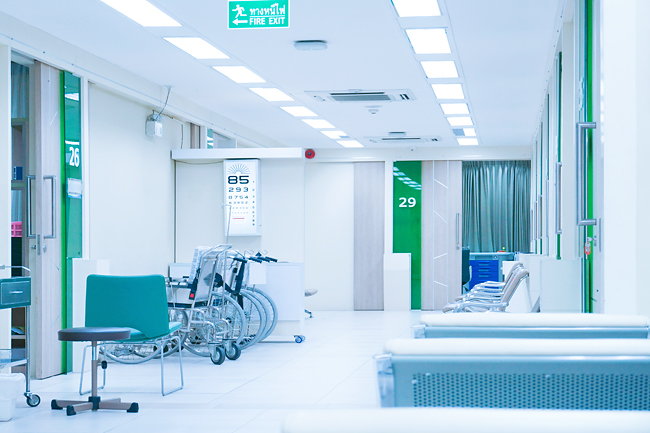Rokiah Mahmud
In carrying out its role and responsibilities, the Ministry of Health (MoH) through its Strategic Plan 2019-2023 aims to achieve excellence in healthcare services; prevention and control of non-communicable diseases (NCDs); public health protection through effective policies and regulations; and sustainability through resource optimisation and innovation.
Minister of Health Yang Berhormat Dato Seri Setia Dr Haji Mohd Isham bin Haji Jaafar said this while presenting his budget deliberation on the 14th day of 19th Legislative Council (LegCo) session.
Towards the efforts in achieving these objectives, the minister shared that the ministry will focus on six clusters.
As he explained, the first cluster is improving the quality of healthcare delivery for the public, and this includes delivering excellent services, improving facilities, building trained personnel and delivering innovative and effective services.
The second cluster, the minister said, is continuously assessing best services both in-house or outsourced.
Among best practices that are managed by clinical services under the ministry is outsourcing non-clinical services to experts in those fields.

Under the second cluster, several projects have been lined up to focus on three main areas: introducing a standard that will be used in non-clinical services to allow appointed companies to achieve the desired quality; shortlisting skilled companies with trained personnel in identified fields, which will also provide opportunities for the locals to be trained and generate employment opportunities; and collaborating with local institutions, including the private sector to jointly coordinate the required programmes as to achieve desired skills.
In line with it, the new job scopes that are being introduced for the year 2022-2023 is outsourcing of porter services, which has generated 208 employment opportunities for locals, most of which do not require high skills training.
With the service, it could address the shortage of hospital’s attendants that are needed in
meeting the increasing service scope at hospitals.
Regarding infrastructure improvement, with the completion of an additional block at the Jubli Perak Sengkurong Health Centre, medical services for residents living nearby can be served more efficiently. At the same time, with the assistance from the Mosque Affairs Department at the Ministry of Religious Affairs (MoRA), the MoH is providing bus service transportation from Sultan Sharif Ali Mosque in Kampong Sengkurong to Jubli Perak Sengkurong Health Centre to address the limited car park in the area.
In the third cluster, the ministry will continue to improve the health quality of citizens and residents in the country especially in reducing the premature death rate for those below the age of 70 due to NCDs.
Apart from premature death, NCDs could also lead to disability, reduced productivity and other economic and social impacts that could affect planning and vision of our country. The ministry is very committed to providing quality medical services and treatment for citizens and residents of the country.
However, he added, efforts need to be increased in the prevention and early detection of diseases through various screening programmes.
Early detection and treatment of these diseases will improve survivability, maintain quality of life and enables individuals to continue being productive and contribute to the country’s economic development.
With early detection and treatment, in the long run, it would lead to cost saving for the government. Meanwhile, as one step forward, genomic screening for certain diseases have also been initiated, and in the future, the concept of current treatment using genomic banking may also be explored.
The fourth cluster that comes under the MoH goals is improving laboratory services with advanced and sophisticated tests.
With the existence of several certain and latest tests – such as safety tests and detection of pollution tests on pharmaceutical and food products that have been conducted locally – it could engage the micro, small and medium enterprises (MSMEs) to generate economic activities and support the export and import of goods and food.
For this, the ministry will continue to collaborate and support efforts made by relevant stakeholders in various industries.
Increasing cooperation with the private sector through public-private partnership (PPP) via the Fiscal Consolidation Programme (FCP) was the fifth cluster elaborated by the minister.
Under the cluster, the aim is to develop the economy in the healthcare sector and support the country’s goal towards sustainable growth. It directly contributes to creating job opportunities for young people to enter support services in the public healthcare sector, he added.
In the sixth cluster, the minister said there is a need to improvegovernment revenue through efficient tax collection practices and easy access to healthcare services and treatment.
He said the ministry always supports initiatives towards strengthening the economy and finances of the country, such as facilitating digital payment procedures at counters as an efficient tax collection practice and regularly updating payment schemes for services, taking into account current trends and inflation rates.
The minister added that towards the effort in reducing the burden of delayed tax collection, the ministry is also collaborating with several agencies to conduct research to update the comprehensive medical insurance coverage for foreign workers.
The initiative also has added-value of ensuring the healthcare of foreign workers in the country is guaranteed while promoting their productivity and well-being throughout their working period in the Sultanate.


